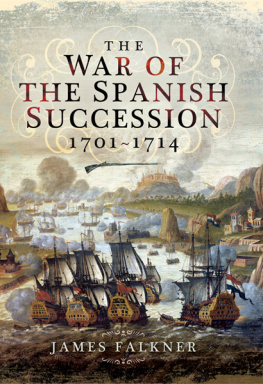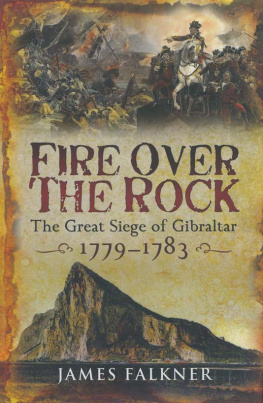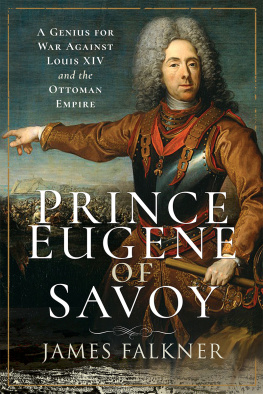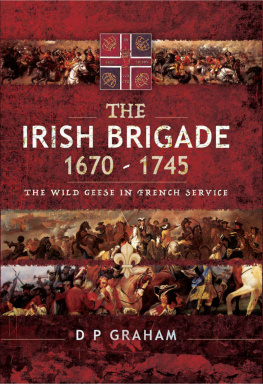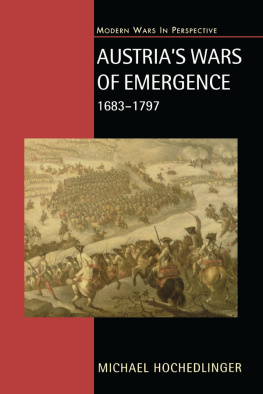First published in Great Britain in 2015 by
PEN & SWORD MILITARY
an imprint of
Pen & Sword Books Ltd
47 Church Street
Barnsley
South Yorkshire S70 2AS
Copyright James Falkner, 2015
ISBN: 978 1 78159 031 7
PDF ISBN: 978 1 47387 290 5
EPUB ISBN: 978 1 47387 289 9
PRC ISBN: 978 1 47387 288 2
The right of James Falkner to be identified as the author of this work has been asserted by him in accordance with the Copyright, Designs and Patents Act 1988.
A CIP catalogue record for this book is available from the British Library.
All rights reserved. No part of this book may be reproduced or transmitted in any form or by any means, electronic or mechanical including photocopying, recording or by any information storage and retrieval system, without permission from the Publisher in writing.
Typeset in Ehrhardt by Chic Graphics
Printed and bound in England
by CPI Group (UK) Ltd, Croydon, CR0 4YY
Pen & Sword Books Ltd incorporates the imprints of
Pen & Sword Archaeology, Atlas, Aviation, Battleground, Discovery, Family History, History, Maritime, Military, Naval, Politics, Railways, Select, Social History, Transport, True Crime, Claymore Press, Frontline Books, Leo Cooper, Praetorian Press, Remember When, Seaforth Publishing and Wharncliffe.
For a complete list of Pen & Sword titles please contact
PEN & SWORD BOOKS LIMITED
47 Church Street, Barnsley, South Yorkshire, S70 2AS, England
E-mail:
Website: www.pen-and-sword.co.uk
Contents
List of Maps
List of Illustrations
Introduction
Isolated and remote. A country divided within itself
Fragmented, disparate, a complex of different races, languages and civilizations.
Whatever natural disadvantages Spain may have had to endure at the close of the seventeenth century, it was the object of much envy in European capitals and, while weakened by a lack of strong central government, was still potentially a force to be reckoned with. In particular the world-wide Spanish Empire, and the rich trading opportunities that went with it, was a prize of huge value that attracted the ill-concealed ambitions of other states, none of whom would view the advancement of the others with complacency. As a consequence, for thirty years or more one of the most burning issues that was discussed in council chambers across western Europe had been the matter of What was to be done about Spain more particularly what was to be done if the king in Madrid died having no legitimate heir.
The awkward question would have to be answered once the ailing King Carlos II went to his grave; there was no obvious immediate successor, for that invalid and enfeebled monarch had no children or younger brother or sister, and yet the vast and immensely wealthy Spanish Empire, stretching from the Iberian peninsula across wide swathes of the Mediterranean and Italy, the Low Countries, enclaves in North Africa, across the high seas to the Americas, and even the far-off Philippines, plainly had to have a firm ruler. Yet, with so much at stake, who was that ruler to be?
In the second half of the 17th Century and the early decades of the 18th Century the most important single theme in European politics was the rivalry between the two hegemonal powers of Austria and France. Among the smaller states the neighbours of France inclined to Austria, and those of the Austrians to France.
France and Austria had arguably good hereditary claims for their princes that was evident but there were others, most notably the Duke of Savoy on the one hand, and that of the house of Wittelsbach, the Electors of Bavaria, on the other. The prolific descendants of King Philip II of Spain had sown a devils harvest for a later generation, but these lesser claimants could hardly expect to make progress unless it was with the connivance and blessing of one or other, or perhaps a little optimistically of both, of the main contenders. Such an approach was not out of the question, for it would suit everyone to avoid outright war over the issue, as the closing decade of the seventeenth century had already been one of ruinously expensive conflict for western Europe.
The question over the succession was complex, and made more so because the aims and ambitions of the contenders, whether large or small, were hedged about by the needs and aspirations of their near neighbours, states that had also every reason to avoid war as long as their interests could be assured. Such assurances would be sought, over such diverse matters as the Protestant succession to the throne in London, the security of the southern border of Holland against any fresh French attack, and opportunities for English and Dutch merchants of the Maritime Powers to trade in the wide Spanish empire, markets hitherto closed to them; guarantees needed to be given, or else they might have to be enforced. When matters came to a head in the late autumn of 1700, at first it seemed that King Louis XIV of France had got what he wanted without fighting, and hoped to retain the same without provoking a war. However, largely due to the kings untypical clumsy mistakes, it proved impossible to avoid war a conflict that no-one sought but perhaps, given the complexity of the principal question of the succession to the throne in Madrid, it was not to be avoided.
Once embarked upon, the conflict itself was on an almost unprecedented scale, covering wide regions of western and northwestern Europe, southern Germany, the Balearic islands of the Mediterranean, much of Italy, briefly an incursion into Scotland, the West Indies, battle-fleet naval actions and wide-scale privateering on the high seas, and even an attack on French-held parts of Canada. In Scandinavia, the Great Northern War would have its effect, at one distant but briefly dangerous remove, and rebellion against imperial rule in Hungary would sap the efforts of the Austrians to press home their claim. A war no one sought but which had to be sometimes these matters had to be put to the crucial test, and so it proved, but it is far easier to start a war than to stop one.
Great issues, both dynastic and national, were at stake but there was little apparent animosity between the belligerents, and despite the cruelties inevitably involved in warfare, barbarism was almost entirely absent from the conflict; prisoners of war were generally well treated (the exceptions at places like Calcinato in early 1706, and Brihuega four years later, were so uncommon as to attract wide comment and criticism). Commanding generals were in many cases well acquainted with their opponents, often listing them as friends and even, as with the Duke of Marlborough and the Duke of Berwick, close relations. The misfortunes of the common people who endured campaigning armies crossing their lands hardly need stating for such things, sadly, must be in warfare. Still, there was little of a fervent or religious nature about the conduct of the war, with all the attendant horrors common in such conflicts, even though the presence of large numbers of Protestant soldiers in staunchly Catholic Spain did the allied cause no good, and the assurance of a Protestant succession to the throne in London was one of the main planks of the Grand Alliance.
The allies ranged against Louis XIV and his grandson did attempt to foment rebellion amongst the Protestants in southern France, but this unhelpful distraction for the king was limited, while his own support for the largely Protestant rebels in Hungary hampered the efforts of Catholic Vienna in the war. The rebellion in the Cevennes region was suppressed with some rigour, as were those Catalans who declared for the Habsburg claimant, but that was the way that rebels were dealt with, then and since. In fact, what each participant sought could have been achieved with judicious negotiation and an element of compromise, and this was proved to be so with the terms belatedly agreed in 1713. In particular, after the lavish expenditure in treasure, effort and blood, the end result would see the Spanish people, whose opinion in the matter had never been sought, on the whole quite content with a king who, contrary to expectation, had proved himself to be worthy of his calling and earned their trust and respect, and perhaps also their love. By a strange irony, when peace came at last, and given a dispassionate judgement, it appeared that everyone had achieved what they originally sought, but no-one was able to say so.
Next page
